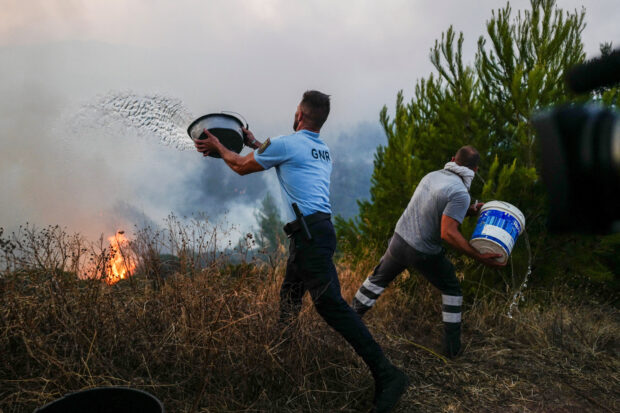Hundreds of firefighters scramble to put out Portugal wildfire

A police officer and a local resident throw buckets of water during a wildfire in Cascais, Portugal, July 25, 2023. REUTERS
CASCAIS, Portugal — Aided by local residents, hundreds of Portuguese firefighters scrambled on Tuesday to put out flames sweeping across a natural park near the popular holiday destination of Cascais, with strong winds complicating efforts to tackle the blaze.
The wildfire started at 5 p.m. (1600 GMT) in a mountainous area that is part of the Sintra-Cascais natural park, which covers around 145 square kilometers (56 square miles) of land and is located west of the capital Lisbon.
Backed by 189 vehicles, more than 600 firefighters were brought in after the fire erupted. Water-bombing planes also battled the blaze but had to stop operating as the night set in.
At one of the villages affected by the fire, desperate local residents took matters into their own hands as they tried to protect their homes with buckets of water and hosepipes, as strong winds fanned the flames.
“The fear now is that it will get to the houses,” said 34-year-old Ines Figueiredo as smoke filled the air. “We try to help as much as we can with buckets (of water)… but it’s not worth much.”
Mayor of Cascais Carlos Carreiras said gusts of up to 60 kph were the biggest challenge ahead, and that a number of people had been evacuated as a precaution.
Residents used wheelchairs to help evacuate those with mobility problems.
“They (firefighters) do what they can,” said Miguel Medeiros, a local resident who has helped fight the flames. “It’s difficult for everyone.”
No houses have been damaged and no major injuries have been reported, according to authorities.
EU data shows Portugal, which has so far escaped the recent heatwave causing deaths and destruction across southern Europe, is usually one of the bloc’s worst-hit countries by wildfire.
Extreme weather in July has caused havoc across the planet, with record temperatures in China, the United States and southern Europe sparking forest fires, water shortages and a rise in heat-related hospital admissions.
RELATED STORIES